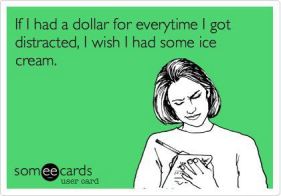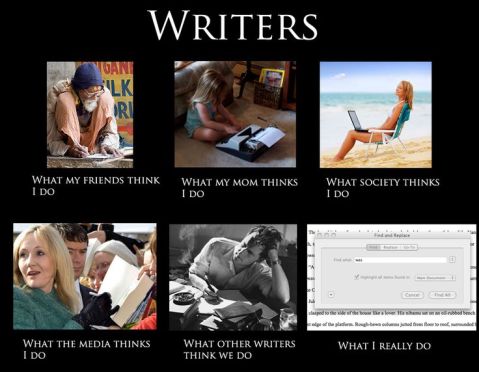Excuses, Reasons, and Distractions – And The Difference Between Them.

I never pretend to be an expert on any topic related to writing nor is it my intention to be an expert. But for the knowledge I lack, I have lessons learned to even the playing field.
Today’s post is about the reason(s) writers don’t write. Non-writers. I use the term ‘reason’, but the truth is there are very few legitimate reasons. For every reason not to write, there are a handful of excuses, and even more distractions.
One legitimate reason is emotion. Any emotion that is stronger than your desire to write will likely keep you from writing: grief/mourning following the loss of a loved one, depression after a divorce, joy/happiness following the birth of a child, to name a few. Some will be able to write through such strong emotions, but more often than not, their work falls into the shadow of that emotion even when the scene doesn’t reflect it. That writing will usually end up on the editor’s floor because it doesn’t quite fit the overall tone of the work.
Self-loathing is the second reason. Some would argue that self-loathing is an excuse and not a reason. I disagree. Much depends on your own personal makeup. Things such as whether you have thin skin and are easily offended, whether you were disillusioned as to what it meant to be a writer, whether you’ve been told that your freshman effort was a great ‘practice’ book. If any of those statements or any others I didn’t mention apply to you, failure will bring about a wicked case of self-loathing. Nothing will make you hate yourself more than to spend three years spit-shining your manuscript until it shines like a Xenon headlight only to have an editor send it back with a larger red pen to typeface ratio.
Self-loathing is what bridges the gap between reasons and excuses. You see, it begins with excuses: “most of my reviews are negative,” “my agent only read the first page before trashing it,” “they just don’t get my genre,” “only those who go to conferences get deals,”… you get the idea. Once a writer begins to rely too heavily on excuses for not writing, self-loathing is soon to follow.
Distractions are everywhere. Some are tangible and have names. They are the easiest to overcome. Facebook. Twitter. LinkedIn. Scrivener.
This type of distraction is the easiest to remedy because even if you lack the willpower to stay off the social media sites, or you find yourself addicted to playing with/learning Scrivener rather than writing the book, there is help. If you Google distraction free writing applications, it will redirect you to an abundance of sites geared toward keeping you off social media and candy crush, and on track. If you find an app that you believe will help, but find yourself spending more time trying to find a way to jailbreak it than writing, maybe you shouldn’t be writing?
Inner distractions are much harder to conquer because there is no app to “fix it” for you. This type of distraction looks something like this:
“Okay, ten o’clock… If I can put in two solid hours, I’ll reward myself with a half-hour bike ride… Oh shit, I forgot to get my bike tire fixed… Actually, I didn’t forget. He said he’d take it on his way to work… Ten o’clock, he should be in that big meeting now… I wonder what it is about… I hope he’s not getting laid off… Mary’s husband got laid off and look at what happened to them… I really need to call her to catch up… I heard her mother’s first husband died and I never called her… She couldn’t stand him anyway so she’s probably over that anyway… Oh my god, why does the neighbor let their diesel truck run for such a ridiculous length of time every morning? Don’t they know they are gassing me out of my own house?… Hmm. It’s been, like, forever since I’ve changed my desktop wallpaper. I’m sick of looking at my brother’s baby staring back at me. She has a fat nose for a kid…”
Stream of conscious.
One of the biggest and baddest distractions known to writers. Sometimes it is our brain’s way of protecting us from excuses and self-loathing. If we try, we may fail. Who WANTS to fail? Not trying at all is the safe bet when the thought of failure is crippling, but it also will never produce results. This is not an excuse because we do not intentionally sit down to daydream. We sit with the intention of writing but quickly fall into that semi-comatose state of being aware of our surroundings without being an active part of them.
Another distraction is preparation without product. Better known as “playing the part” of a writer, without actually writing. This is a broad category. It can center around one task, such as Scrivener. There are thousands of tutorials on the internet that teach you the many tips and tricks of what is one of my favorite pieces of software of all time. A non-writer will buy the software with the very best of intentions to use it to write that book idea that keeps them awake at night. They get it, install it, and then realize it’s a robust program with a learning curve attached. But they’re not intimidated by it. Rather, they enjoy exploring the program so much that when they sit down to their computer each morning, they open it not to work on the WIP, but to see what little Scrivener gems they can uncover that day. This doesn’t qualify as an excuse because excuses are intentional. This just happens. A writer talks himself into believing that by wandering around Scrivener for hours that turn into days, he is adding to his arsenal of writing tools and with those tools, he will better be able to hone his craft. Simple justification of preparation without product.

Another writer will read. We all know that as writers, we should read well and often. So the writer who reads a lot is technically preparing for work, but if he never applies what he’s learned he’s not a writer. He’s a voracious reader. There is a difference.
Another prep method that will keep a non-writer not writing—reference books. This is where a writer reads select paragraphs, sections or even chapters of writing reference books/magazines without reading the entire book. Again, preparation without product. He is gaining knowledge that would come in as handy as nose plugs in a Port-O-Potty – IF he ever planted his butt in his chair and wrote that book.
Not all writers have issues with excuses, reasons, and distractions. There are writers out there who are prolific, pumping out four or more books a year. (I seriously suspect they consume coffee by the keg and pop whites…) There are also the coffee-drinking (but no whites) writers who are consistent – a book a year, or so. I have only recently fallen into the book a year club. My writing past looks like this:
2004 Missouri in A Suitcase*
2011 Lily White Lies*
2014 The Red Strokes*
2016 Cry Like A Girl*
2017 Run Like A Girl
2017 Christmas Carol
2018 Fight Like A Girl
*Published and available for purchase
Pathetic To Prolific!
As you can see, it took me a while to get into the zone (and stay there). I allowed self-loathing to thwart my attempts to write (2004-2008). It was a bonafide reason as I couldn’t help it. But my desire to write was greater than my reasons not to. I only managed two books between 2008 and 2015. This was my excuse period. A new relationship turned into a toilet flush that spent years trying to take me down. I put too much time and effort into that dead end and used every minute of it as an excuse to not write. I managed to put out two books (one was even an award-winner) but it was not without pain. If writing were supposed to be that painful, there would be fewer writers among us. It wasn’t until I saw my way clear of my mistake-of-the-emotional-variety that my writing reached a place where we could live in harmony. Distractions have never been much of a problem for me. I check email and any relevant social sites first thing in the morning, even before I open Scrivener, to get them out of the way. I generally write for a couple hours before taking a five or ten minute break. That’s long enough to stretch my legs, but not so long that I lose the thread of the scene I was working on. I repeat those two steps until I feel satisfied with what I’ve put out for the day. Sometimes it’s 8,000 words and other times it’s 1,000 words and a character profile.
Preparation is a must, there’s no getting around it. But only as long as you don’t turn it into the main event. And everyone becomes distracted on occasion, but learn to pull back before you put too much distance between you and the words. As for excuses, learn to write through them. The kids are being too noisy? Write about it. Yell, scream, kick at the disruption – on paper. Most times, writing crap is better than not writing at all. Again, I’m no expert, but I think those who are would agree. Write. Write. Write. Right?
What is your fatal flaw? Your time-suck? Your most tried and true excuse? What do you do to plow through them? Help others who are struggling by sharing your story.
One thought on “Excuse? Reason? Distraction?”